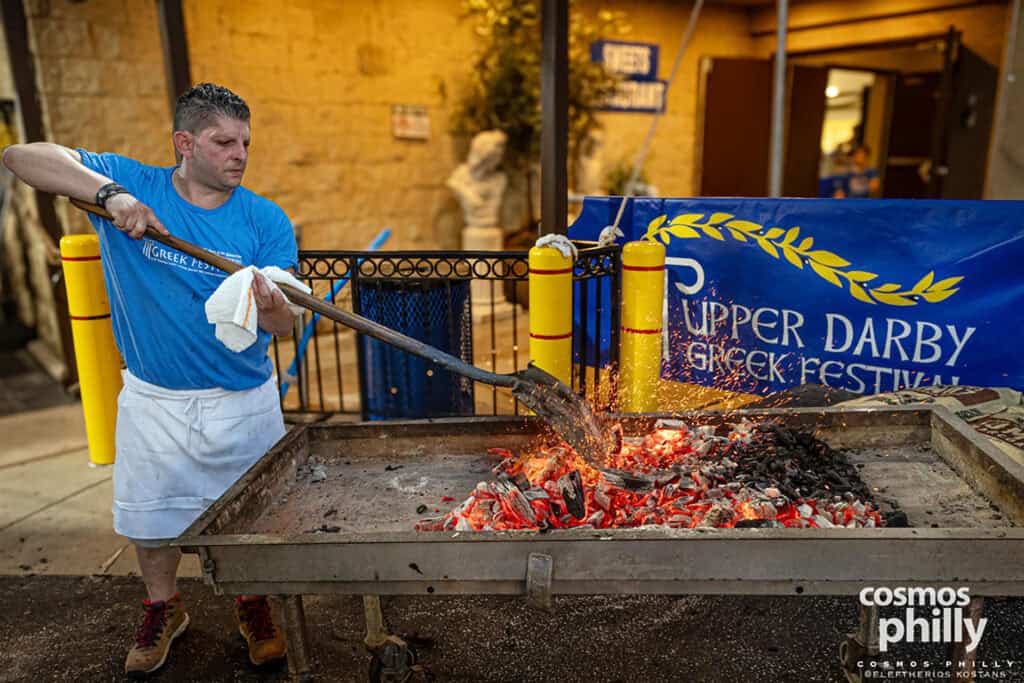At a recent Greek festival, I was sitting down drinking a Frappe, people watching, enjoying the weather, and listening to the haunting melodies of the bouzouki coming over the loudspeakers. Ahhhh… the sound of the bouzouki. An instrument that makes your emma rise to heart attack levels when it solos. An instrument that pulls at your emotions when played right. The bouzouki is to Greek music what the guitar is to blues or the piano to jazz. It’s a perfect match and it’s so Greek.
But, unfortunately the bouzouki I was listening to was not played by a live bouzouki player who had studied years at his craft and purchased a hand-made piece of art created by a maestro that took months to build and cost money… a lot of money.
No, what I was listening to was a bouzouki from a scratchy, old record that some parishioner found in his parents’ stack of albums or 8-track tapes when he cleared out their attic years ago and someone converted over to a CD – scratches and pops all included. (The only good thing about that was that at least the song had bouzouki in it. I know some Greek festivals where the overhead Greek music sounds like a Janet Jackson concert and not one bouzouki… are ya kidding me!)
Back to the story. I got up and made my way over to the chairman of the festival, who I knew very well, and asked, “Where’s the band?” He quickly replied, “Band? Why do we need a live band? We can get monkeys to play and they will still come for the food.” He saw my face and couldn’t tell if I was about to burst out laughing or begin to cry and so he added, “Besides, live bands are too expensive.”
What has happened to us? Is the only thing left in our Greek heritage just food?
At one time we prided ourselves on showcasing our Greek heritage through our Greek festivals. Over the last fifty years we’ve taught our fellow Americans what a gyro is and the benefits of Greek yogurt. We have educated them in our Greek Orthodox faith. We have taught them to say, “Opa” and “Yia’sou.” We also taught them to dance, just like Zorba! Through our festivals, we have shown them what the word, filotimo, truly means.
But, sorry, no more. The Monkeys are here.
We have decided that it is more important to just serve food and look at the cost of the festival and the bottom line, just like a corporation, rather than what a Greek festival is all about – an extension of our community in all aspects, including food, culture, music, and filotimo. In the end, people – you can’t have a Greek festival without a LIVE Greek band! Scratchy records don’t cut it and Greek Janet Jackson wannabes don’t either.
I agree, it’s important to look at the cost of the products we use because, when all is said and done, we hold the festivals so we can bring in revenue to pay for our Church’s expenses. But, it’s just not about gyros, souvlaki, and pastries, boys and girls. Of course, these are the money makers and most of us can understand that it costs $4.00 to make a gyro sandwich and we sell it for $8.00, so there is a $4.00 profit – Economics 101.
Let’s look at the other side. What money do the “colored” lights hanging in the taverna tent bring in? What money does an actor dressed like Socrates roaming the festival grounds bring in? What money does a man making balloon animals for the kids bring in? What money does a live Greek band bring in? The answer is simple… a lot more than the $4.00 profit on a souvlaki.
You snicker. Hear me out, ye of little faith.
100 people come to the festival and they each walk around for about 15 minutes to see what is happening (they can hear the scratchy bouzouki playing over the loudspeakers). Each of the 100 people then buy a gyro and a Coke and after those 100 people eat their gyros and drink their Coke, they may walk around for about another ½ hour and buy some pastries to take home and maybe a little Greek trinket. For argument sake, let’s say their total bill averages out to $30.00 per person, with a profit of $15.00 per person. That is a $1,500.00 profit made by those 100 people. Since nothing else is going on, after an hour, they go home.
Now, those same 100 people come and buy the same things, but, the difference is that there is a live Greek band playing and the tent is decorated with colored lights and other “taverna-like” decorations. People are starting to dance because of the festive atmosphere. In the meanwhile, Socrates is walking around the festival grounds talking to people about – what else, philosophy, and there are 30 kids surrounding a man making balloon animals while their parents are shopping. But some say that this all cost money and doesn’t bring in anything. Absolutely wrong! Those 100 people who have made the church $1,500.00 profit in the previous example, now stay another hour, maybe two, or even three, and start dancing or listening to music.
And the million dollar question is? What do they do when they stay for the extra hour, or two, or three? Like Archimedes said, “Eureka! I’ve got it!” Those 100 people continue to buy things at the festival. More drinks, more pastries, more gyros. They see friends and start buying them drinks who, in turn, buy others drinks, and more food. Next thing you know, that $1,500.00 profit now becomes $6,500.00 profit… all because the Monkeys left and a real live Greek band is playing. And, for no other reason, doesn’t it must look more professional?
You’ve spent months getting everything together, preparing the food, ordering the tents, organizing everything, the kids practicing their dance steps, and costly advertising. So why screw it up. Don’t let the Monkeys play at your next Greek festival. Hire a real, live Greek band and let your guests dance the night away. They may not remember the pastitsio they ate, but they will certainly remember the fun they had dancing and singing, and will probably come back again and again.








